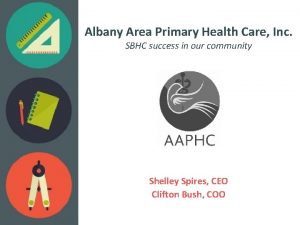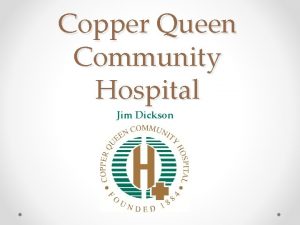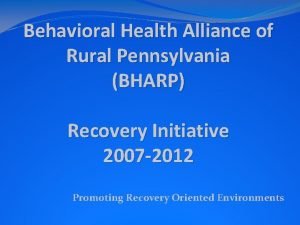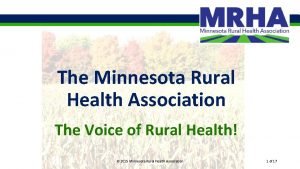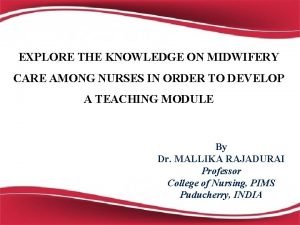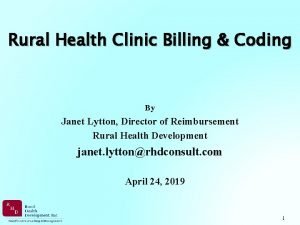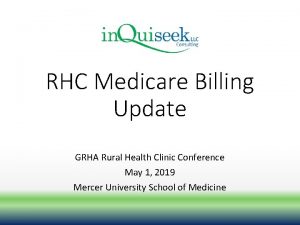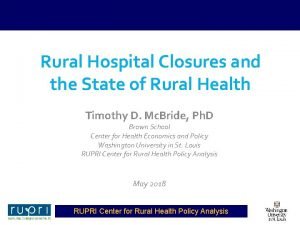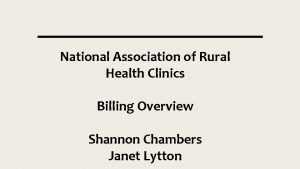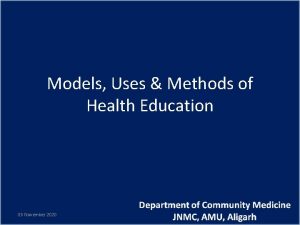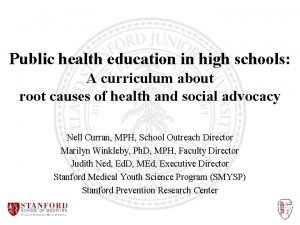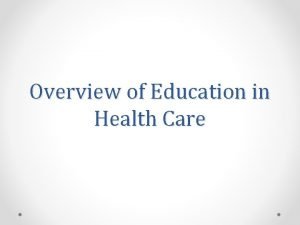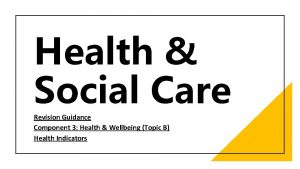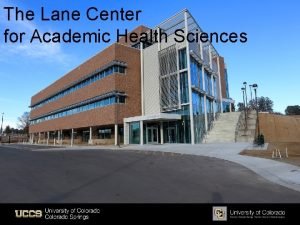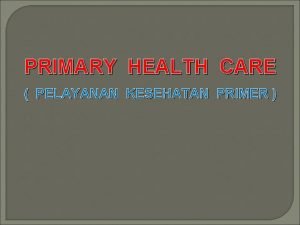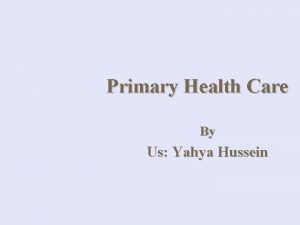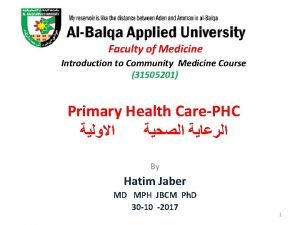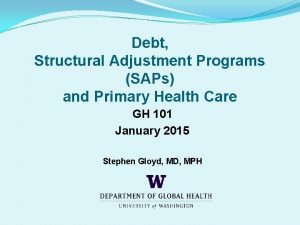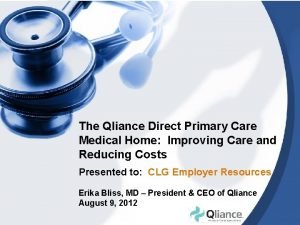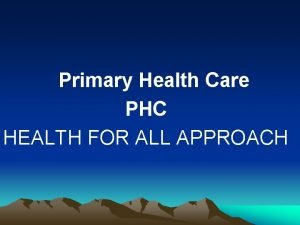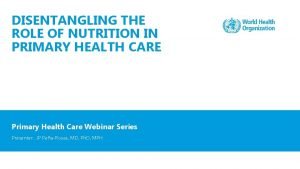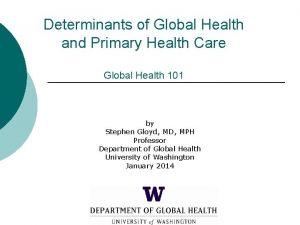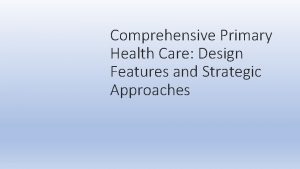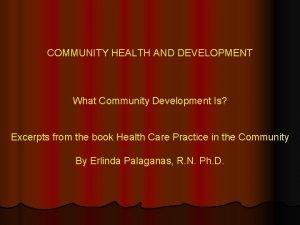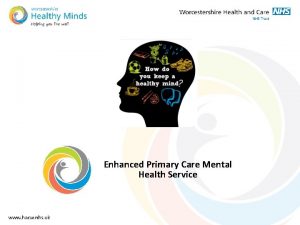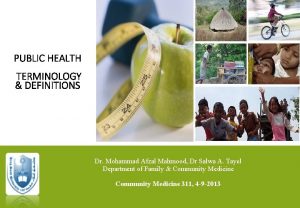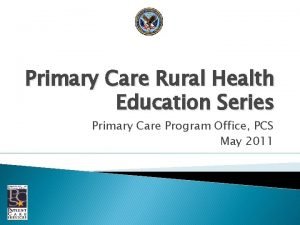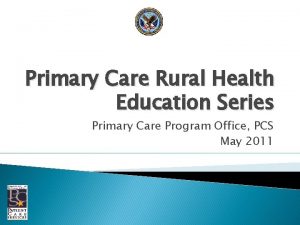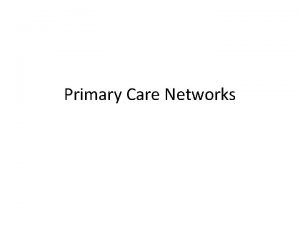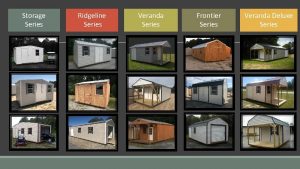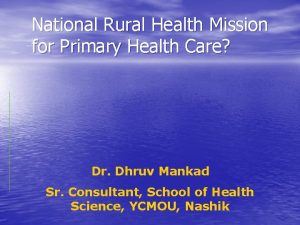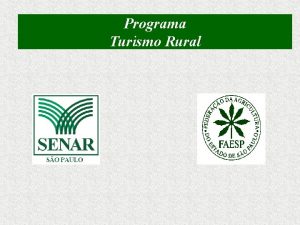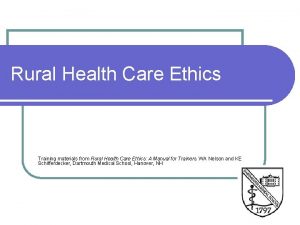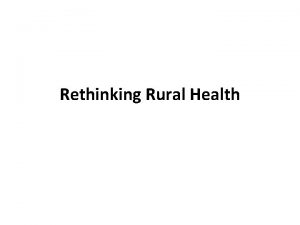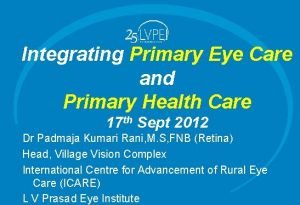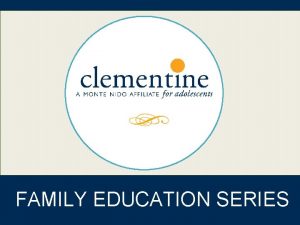Primary Care Rural Health Education Series Primary Care
































- Slides: 32

Primary Care Rural Health Education Series Primary Care Program Office, PCS May 2011

PC Rural Health Series Purpose: To provide virtual education support primarily to rural primary care providers (PCP) to help ensure all Veterans receive uniform, competent, expert care by VHA physicians regardless of geographic setting. Geriatrics -Dementia -Frailty -Sex & Driving - Advanced Care Planning -Screening Mental Health -Evaluation & Treatment of Anxiety, Depression, & Suicidality -Alcohol Misuse -PTSD Pain Management -Complex Chronic Pain -Stepped Integrated Pain Care Post Combat Care -Post Deployment for Frontline Providers -C&P Process -Environmental Agent Exposure -Military Culture

PC Rural Health Series in LMS Each course is prepared by a nationally recognized subject matter experts who are also expert clinicians and excellent teachers Each module is comprised of four to five courses Each course has an exam as a means of verifying learning. Within LMS, there are multiple means of learning including watching the courses and reviewing of the slides. Once the learner passes the exam, they will receive a certificate of completion. The course is also ACCME accredited and learners will receive 1 hour of Continuing Medical Education (CME) credits per course

Direct Link to Courses Module LMS ID No. Title and Direct Link Geriatrics VA 8896 Advance Care Planning: A Collaborative Interdisciplinary Process Geriatrics VA 8897 Co morbidity and Frailty: Two Important Concepts in Geriatric Care Geriatrics VA 8900 Evaluation and Management of Dementia: Key Concepts for Primary Care Geriatrics VA 8910 Screening for Common Geriatric Conditions among Older Adults in Primary Care Geriatrics VA 8911 Sex and Driving: Two Tough Conversations We Need to Have with our Older Patients Mental Health VA 8899 Evaluation and Management of Alcohol Misuse in Primary Care Mental Health VA 8901 Evaluation of Anxiety, Depression, and Suicidality in Primary Care Mental Health VA 8909 Screening and Evaluation of PTSD in Primary Care Mental Health VA 8914 Treatment of Anxiety and Depression in Primary Care Pain Management VA 8898 Collaborative Care Model of Complex Chronic Pain Management VA 8905 Practical Suggestions for Helping Veterans with Complex Chronic Pain Management VA 8913 Stepped Integrated Pain Care in the VHA, Part 1 Pain Management VA 8912 Stepped Integrated Pain Care in the VHA, Part 2 Post Combat Care VA 8886 Environmental Agent Exposures in Veterans and Risk Communication for Frontline Providers Post Combat Care VA 8888 Post Deployment Care for Frontline Providers Post Combat Care VA 8890 The Compensation and Pension Exam Process and VA Benefits Post Combat Care VA 8891 Why Military Culture Matters: The Military Member's Experience Tip: LMS Search

PC Rural Health National Call Series May June Jully August • Geriatrics: May 18, 2011 @ 1 PM EST • Pain Management: June 15, 2011 @ 1 PM EST • Post Combat Care: July 20, 2011 @ 1 PM EST • Mental Health: Aug 17, 2011 @ 1 PM EST Questions regarding the Primary Care Rural Health Education Initiative may be directed to Miyako Wilson at 202 -461 -7180 or Gordon Schectman at 414 -384 -2000 ext. 42684.

Geriatrics in Rural VHA Primary Care Heather Whitson, MD Durham Geriatric Research, Education, and Clinical Center (GRECC) Duke University School of Medicine B. Josea Kramer, Ph. D Greater Los Angeles GRECC UCLA David M. Geffen School of Medicine

Geriatrics Challenges in VHA Rural Primary Care � >50% of Veterans seen in VHA Primary Care age 65 and above � >30% are age 75 and above � Rural counties have higher proportions of elderly residents than urban and suburban ones; trend is even greater for Veterans � Elderly rural Veterans are challenged by travel, communications, non-institutional resources, community support systems …the resources described in this hour are offered to help support and enhance your Primary Care PACT’s abilities and confidence to do as much as you can for the older Veterans in your panels!

Support for Rural VHA Primary Care from Geriatrics & Extended Care (GEC) � New non-institutional programs supported by the Office of Rural Health (ORH) ◦ New and modified Home-Based Primary Care programs ◦ VHA/Indian Health Service collaborations � Non-institutional extended care pilots ◦ Dementia care “circuit riders” ◦ Mobile vans � A variety of GRECC* educational materials and opportunities ◦ Pocket cards of GEC services; Differential Diagnoses; Geriatric Assessment; Falls assessment ◦ CBOC educational outreach/QI training (VISNs 11, 19) ◦ Monthly Geriatrics Audioconferences (national) � 4 th Thursday, 3 pm eastern, 1 -800 -767 -1750; x 89095# � Audio and visual content archived at http: //www. greccaudio. geriu. org/ ◦ “Geri-Scholars”--an intensive specifically for rural primary care clinicians � Primary Care Rural Health Education Series *http: //www. va. gov/GRECC_Demographics_and_Profiles. asp

The VA Geriatric Scholars Program A collaboration of VA Office of Geriatrics and Extended Care and Geriatric Research Education & Clinical Centers (GRECC) A program made possible by funding from the VA Office of Rural Health B. Josea Kramer, Ph. D Director, VA Geriatric Scholars Program Associate Director for Ed/Eval, GRECC VA Greater Los Angeles Healthcare System GRECC

Geriatric Scholars Program: 2008 -2010 • 140 VA Scholars • 40 States, 2 US Territories • 110 # Rural Clinic VISN # CBOC # Scholars 1 2 3 4 5 6 9 5 3 3 2 3 12 6 3 3 4 6 12 15 16 17 18 19 2 6 8 3 8 4 3 7 8 5 9 6 7 4 5 20 3 4 8 9 10 11 7 7 8 5 8 10 11 8 21 22 23 10 0 8 10 0 12

Who are the Scholars? 80 70 68 60 50 38 40 30 23 20 11 10 0 Physicians Primary Care Providers NP and PA Social Workers Pharmacists Support Team Members

Geriatric Scholars Program Intensive Didactic Geriatric Medicine, ≥ 30 hours CME/CEU Mandatory Components Intensive Didactic Quality Improvement, ≥ 8 hours CME/CEU Initiate local QI Project to improve care for older Veterans

Distance Education - QI Live. Meeting & Telephone Conference - Aging Successfully Newsletter -Webinar Series at request of Geriatric Scholars -Web-based education: “Challenges to Delivering Geriatric Care for Veterans in Rural Settings -Monthly GRECC Audio Conferences Optional Components Clinical Practicum, various foci Mentoring for Clinical Coaching for Quality Improvement Learning Community Interdisciplinary Team Training On-Site & Virtual (Pilot FY 11) On-Going Support: Enduring Educational Materials Alumni Geriatric Course intensives & Practica


Goals: To provide professional development to the health provider participating in the Geriatric Scholars program Objectives: Webinar Part 1 – To improve their communication skills in knowledge transfer with their peers who work in Community Based Outpatient Clinics (CBOCS) Webinar Part 2 – To define the basic theories of adult learning to better understand what motivates and engages adults to incorporate new information into their health behaviors Webinar Part 3 – To identify literacy barriers that affect learning in older patients. “SLIDES WILL BE ARCHIVED” For Further Assistance Contact: Lauren Ila Jones, Ph. D. Program Manager, Geriatric Scholars Program GRECC/VA GLAHS-Sepulveda Campus 16111 Plummer St. (11 E) Ph (818) 891 -7711 x 9156; lauren. jones@va. gov

Learning Community http: //vaww. portal. gla. med. va. gov/sites/GRECCNew/scholars/default. aspx � Geriatric Scholars Program information � State-of-the-Art Geriatrics ◦ Toolkits, Clinical Guidelines, Resources � CPRS Templates � Education calendar � Discussion Boards

Quality Improvement Projects in collaboration with national Quality Scholars Program � Evaluation: Application of knowledge � Participation in annual Geriatrics & Extended Care Leads conference � Projects on display in facilities and VISN offices Other benefits: Meets recertification requirement: Self evaluation of practice performance Project approval through Quality Management



The Scholars’ Own Words About the Geriatric Scholar Program “This program has helped me with my day to day practices. I feel more comfortable in my role. I can communicate better with my team and patients. . . ” “Please send my thanks to the people in charge--you really motivated me to decide to go back and do my doctorate. ” “Very fortunate to have the opportunity to be a part of the program. ” “It's been great - great to learn something new on a regular basis. ”

Who is Eligible and How to Apply � New class enrollment will be announced by DUSHOM to the Networks � VISNs nominate Scholars to attend � Eligibility: ◦ Rural VA CBOCs, VA employee ◦ Discipline ◦ Commitment to complete course New Class Enrollment Starting Soon!

The Geriatric Scholars Collaboration � Josea Kramer, Ph. D � Kenneth Shay, DDS � Judy Howe, Ph. D � Ronni Chernoff, Ph. D � Steven Barczi, MD � Kathy Horvath, Ph. D � Terri Huh, Ph. D � Nina Tumosa, Ph. D � Michele Saunders, DMD � Robert Dittus, MD & Jacob Hathaway, MD Greater Los Angeles GRECC VA Office of GEC Bronx GRECC Little Rock GRECC Madison GRECC New England GRECC Palo Alto GRECC Saint Louis GRECC San Antonio GRECC Tennessee Valley GRECC & Nat’l VA Quality Scholars

Primary Care Rural Health Education Series in Geriatrics Main goal: To increase providers’ comfort and knowledge about important and common geriatric conditions and issues

Assumptions Almost all providers in the VA have experience and skill in caring for older adults We all have a lot to learn

Original Topic List Assessment and referral of geriatric conditions Frailty Dementia and other cognitive changes Palliative care Falls and locomotor problems Pharmacology in older adults Genitourinary issues in older adults Long-term care Caregiver and home assessment Musculoskeletal diseases in older adults Infections in older adults Circulatory diseases in older adults Endocrinopathies in older adults

Current Lectures � Advance Care Planning: A Collaborative Interdisciplinary Process � Comorbidity and Frailty: Two Important Concepts in Geriatric Care � Evaluation and Management of Dementia: Key Concepts for Primary Care � Screening for Common Geriatric Conditions among Older Adults in Primary Care � Sex and Driving: Two Tough Conversations We Need to Have with our Older Patients

Highlight: Advance Care Planning Next of Kin Hierarchy in VA • A relative 18 years of age or older, in the following order of priority: – Spouse – Child – Parent – Sibling – Grandparent – Grandchild – Close friend

Highlight: Frailty and Comorbidity Pearls for Management � Less May Be More ◦ Avoid polypharmacy. �Can the problem be addressed without a prescription pad? ◦ More permissive approach chronic disease management ◦ Cease preventive screening if life expectancy is < 5 years U. S. Air Force Photo by Airman 1 st Class Adam Grant/Released

Highlight: Dementia in the VA Current Year Peak Year After Peak 563, 758 2012 571, 614 Decline Thru 2022 Enrollees 317, 943 2015 339, 248 Slight Decline Thru 2022 Patients 192, 724 2017 218, 017 Very Slight Decline Veterans Thru 2022 Urban rural split: 38% of Veterans live in rural areas and 75% of rural Veterans are over the age of 65.

Highlight: Screening for Urinary Incontinence Single item screener (with follow-up items for positive response) “During the past 3 months, have you leaked urine (even a small amount)? ” If yes, then ask: “During the past 3 months, did you leak urine most often”: “When you were coughing, laughing, sneezing, lifting or exercise? ” (suggests stress incontinence) “When you had the urge to urinate, but you couldn’t get to the toilet fast enough? ” (suggests urge incontinence) Neither or both

Highlight: Sex and Driving Older adults are sexually active � Population survey (n=3005, age range 57 – 85) Age % sexually active 57 – 64 73 65 – 74 53 75 – 85 26 � Sexual activity is associated with quality of life � Predictors of reduced sexual activity: – Advanced age, lack of partner, female sex, poor health of person or partner Lindau ST, et al. NEJM, 2007

Questions?
 Albany area primary health care dental
Albany area primary health care dental Rural health care
Rural health care Levels of care primary secondary tertiary
Levels of care primary secondary tertiary Bisbee rhc
Bisbee rhc Behavioral health alliance of rural pennsylvania
Behavioral health alliance of rural pennsylvania Minnesota rural health association
Minnesota rural health association National rural health mission
National rural health mission Rural health clinic coding
Rural health clinic coding Medicare rural health clinic billing
Medicare rural health clinic billing Rural health
Rural health 0521 revenue code
0521 revenue code Difference between health and health education
Difference between health and health education Health propaganda definition
Health propaganda definition Health education topics for primary school students
Health education topics for primary school students Example of nursing process
Example of nursing process Health and social care component 3 health and wellbeing
Health and social care component 3 health and wellbeing Uccs wellness center
Uccs wellness center Australian primary health care research institute
Australian primary health care research institute Makalah konsep pelayanan kesehatan primer
Makalah konsep pelayanan kesehatan primer Dr. kanupriya chaturvedi
Dr. kanupriya chaturvedi Advantages of selective primary health care
Advantages of selective primary health care Phc defination
Phc defination Concepts of primary health care
Concepts of primary health care Basic requirements for sound phc
Basic requirements for sound phc Structural adjustment programs
Structural adjustment programs Direct primary care tacoma
Direct primary care tacoma Appropriate technology in primary health care
Appropriate technology in primary health care Nutrition in primary health care
Nutrition in primary health care Elements of primary health care
Elements of primary health care Comprehensive primary health care approach
Comprehensive primary health care approach Purpose of home visiting in community health nursing
Purpose of home visiting in community health nursing Enhanced primary care mental health
Enhanced primary care mental health Public health terminology
Public health terminology
